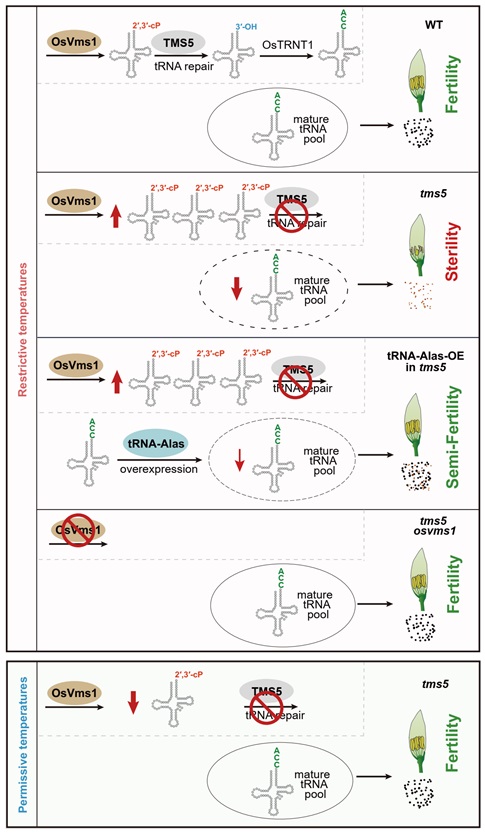Hybrid rice technology is a significant advancement in China's agricultural innovation. This widespread adoption has substantially increased rice yields, contributing significantly to food security both in China and worldwide. Due to technical and varietal advantages, the two-line hybrid rice breeding has become a primary strategy for exploiting the benefits of rice heterosis. Notably, over 95% of two-line hybrid rice varieties contain the thermos-sensitive male sterility (TGMS) gene tms5, highlighting the crucial role of tms5 in the breeding of two-line hybrid rice. Previously, researchers found that TMS5 encodes a ribonuclease ZS1, RNase ZS1, and a point mutation in tms5 causes premature stop codon in RNase ZS1. However, the mechanism underlying tms5-mediated TGMS remains unclear.
After more than ten years of collaboration, three teams led by Prof. Xiaofeng Cao and Prof. CHEN Yuhang from the Institute of Genetics and Developmental Biology, Chinese Academy of Sciences, and Prof. YANG Yuanzhu from Yuan Longping High-tech Agriculture Co., Ltd.
demonstrates the mechanism
underlying tms5-mediated TGMS in rice and provides novel mechanistic insight into the improvement of TGMS in hybrid crop development.
The researchers first identified that TMS5 is a tRNA 2′,3′-cyclic phosphatase which repairs 2′,3′-cP-ΔCCA-tRNA to promote tRNA recycling. Cystal structure and mutation analysis revealed that the key catalytic sites, dimerization and the flexible arm for RNA substrate binding are required for enzymatic activity and biological function of TMS5.
Further, they developed the high throughput sequencing techniques, RcP-RNA-seq and FINE-tRNA-seq, to evaluate the cP-RNAs and mature tRNAs in genome-wide. Using these two techniques, they demonstrated that TMS5 mutation causes increasing cP-ΔCCA-tRNAs, which is exacerbated by high temperatures, thereby decreasing mature tRNAs, particularly alanine tRNAs (tRNA-Alas). Genetic analysis revealed that overexpressing tRNA-Alas in the tms5 mutant restores male fertility up to 70%, suggesting that the insufficiency of mature tRNAs is the major cause of tms5-mediated TGMS.
Importantly, knocking outOsVms1, which encodes an enzyme generating cP-ΔCCA-tRNAs, in the tms5 mutant can restore the abundance of cP-ΔCCA-tRNAs and mature tRNAs, thereby completely restoring male fertility at high temperatures.
Taken together, this study revealed the molecular mechanism of tms5-mediated TGMS caused by mutations in TMS5 leading to failed repair of cyclic phosphate tRNAs and insufficiency of mature tRNAs. Since maize TMS5 mutation also leads to a TGMS phenotype, and the structure as well as biochemical activity of TMS5 are very similar to those of its mammalian homolog, ELAC1, this study not only provides theoretical support for hybrid breeding in other crops, aiding in the development of TGMS lines in other plants, but also offers new insights into understanding reproductive health and fertility treatments in humans and higher animals.
This work, entitled “Impaired 2′,3′-cyclic phosphate tRNA repair causes thermo-sensitive genic male sterility in rice”, was online published in
Cell Research on Sept. 9, 2024 (
https://doi.org/10.1038/s41422-024-01012-4).
A model elucidating impaired 2′,3′-cyclic phosphate tRNA repair underlying tms5-mediated TGMS in rice (Image by IGDB)
Contact:
Dr. CAO Xiaofeng
Institute of Genetics and Developmental Biology, Chinese Academy of Sciences
 A model elucidating impaired 2′,3′-cyclic phosphate tRNA repair underlying tms5-mediated TGMS in rice (Image by IGDB)Contact:Dr. CAO XiaofengInstitute of Genetics and Developmental Biology, Chinese Academy of SciencesEmail: xfcao@genetics.ac.cn
A model elucidating impaired 2′,3′-cyclic phosphate tRNA repair underlying tms5-mediated TGMS in rice (Image by IGDB)Contact:Dr. CAO XiaofengInstitute of Genetics and Developmental Biology, Chinese Academy of SciencesEmail: xfcao@genetics.ac.cn CAS
CAS
 中文
中文




.png)
